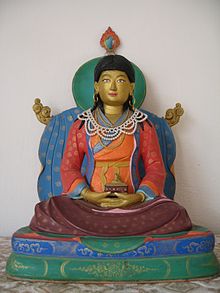Kunzang Dekyong Wangmo
Sera Khandro Kunzang Dekyong Wangmo | |
|---|---|
སེ་ར་མཁའ་འགྲོ་ཀུན་བཟང་བདེ་སྐྱོང་དབང་མོ། | |
 A statue of Sera Khandro | |
| Personal | |
| Born | 1892 |
| Died | 1940 (aged 47–48) |
| Religion | Buddhist |
| Nationality | Tibetan |
| Lineage | Nyingma |
| Other names | Bde-baʼi-rdo-rje, mDo-med mkhaʼ-spyod, dBus-bzaʼ mkhaʼ-ʼgro kun- bzang bde-skyong dbang-mo |
| Organization | |
| Temple | Sera Tekchen Chokhorling[1] |
| Senior posting | |
| Reincarnation | Yeshe Tsogyal |
Sera Khandro Kunzang Dekyong Wangmo (1892–1940) or Sera Kandro is considered an emanation of Yeshe Tsogyal, and in her lifetime was a Tertön of Tibetan Buddhist Vajrayana, a biographer and autobiographer, and a highly respected teacher.[2][3] She taught Dudjom Rinpoche, Chatral Rinpoche, and the First Adzom Drukpa, Drodul Pawo Dorje, among other high lamas.[3]
Sera Khandro was born into a rich family, but ran away at the age of 14 to escape an unwanted engagement, and to follow the Vajrayana teacher Drime Ozer, who was then in Lhasa on pilgrimage from Golok in Eastern Tibet.[4] She returned with him and his students to Golok, where she lived as a renunciate. There, Sera Khandro became life partners with Garra Gyelse.[3] [4]
Garra Gyelsel disliked her Terma revelations, and this caused Sera Khandro to become sick.[4] Her health returned when she left and returned to Drime Ozer with whom she subsequently revealed the specific treasure scriptures, or Terma, for which Sera Khandro is known.[4] From when she was young she had experienced visions of Vajravarahi and exhibited many confirming indications of being a treasure revealer, a Terton. This meant that Sera Khandro had karmic connections with hidden treasures of the Nyingma Terma lineage, and to those which concealed the Termas, eighth-century Vajrayana master Padmasambhava and his consort and Vajrayana master Yeshe Tsogyal.[4]
Sera Khandro was a teacher to many high Nyingma lamas, including Dudjom Jigdral Yeshe Dorje and Chatral Sangye Dorje.[4]
She is considered an emanation of Yeshe Tsogyal.[2]
In Sarah H. Jacoby's Love and Liberation: Autobiographical Writings of the Tibetan Buddhist Visionary Sera Khandro (New York: Columbia University Press, 2014), the author wrote Khandro was "one of the few Tibetan women to record the story of her life." Khandro also wrote the biography of her guru, Drimé Özer,[5] son of the Terton Dudjom Lingpa.
Books and academic articles
[edit]- (in English) Zangpo, Ngawang (2002). The Immaculate White Lotus in Guru Rinpoche: His Life and Times. Boulder: Shambhala Publications. p. 360. ISBN 978-1559391740.
- (in English) Khandro, Sera. Refining Our Perception of Reality: Sera Khandro's Commentary on Dudjom Lingpa's Account of His Visionary Journey. Shambhala Publications. p. 456. ISBN 978-0231147699.
- (in English) Jacoby, Sarah H. (2015). Love and Liberation: Autobiographical Writings of the Tibetan Buddhist Visionary Sera Khandro. Columbia University Press. p. 336. ISBN 978-1559394246.
- (in English) Jacoby, Sarah H. (2014). The Excellent Path of Devotion: An Annotated Translation of Sera Khandro's Short Autobiography, in Himalayan Passages: Tibetan and Newar Studies in Honor of Hubert Decleer. Boston: Wisdom Publications. p. 384. ISBN 978-1614290735.
- (in English) Jacoby, Sarah H. (2010) [2009]. "This Inferior Female Body:' Reflections on Life as a Treasure Revealer Through the Autobiographical Eyes of Se ra mkha' 'gro (Bde ba'i rdo rje, 1892-1940) in" Journal of the International Association of Buddhist Studies 32/1-2 (2009/2010): pp. 115-150. (PDF).
- (in English) Jacoby, Sarah H. (2009). To be or not to be Celibate: Morality and Consort Practices According to the Treasure Revealer Sera Khandro's (1892-1940) Auto/biographical Writings, in Buddhism beyond the Monastery: Tantric Practices and their Performers in Modern Tibet (PDF). Leiden: Brill. p. 202. ISBN 978-9004176003.
References
[edit]- ^ "Sera Tekchen Chokhorling". The Treasury of Lives. Retrieved 2016-12-10.
- ^ a b Kurtis R. Schaeffer (2013). Sources of Tibetan Tradition. ISBN 9780231135993. Retrieved 1 May 2015.
- ^ a b c "Biography: Sera Khandro Kunzang Dekyong Wangmo". The Treasury of Lives. Retrieved 1 May 2015.
- ^ a b c d e f Alexander Gardner. "Treasury of Lives: Female Buddhist Masters". tricycle. Retrieved 22 September 2016.
- ^ Jacoby, Sarah Hieatt (2007). "Consorts and Revelations in Eastern Tibet : The Auto/Biographical Writings of the Treasure Revealer Sera Khandro (1892-1940)". UVA Library | Virgo. Retrieved 2017-08-06.
